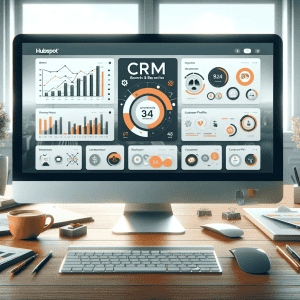HubSpot, Dynamics 365, Freshdesk, and Salesforce
HubSpot: The User-Friendly Powerhouse
HubSpot is renowned for its user-friendly interface, comprehensive suite of tools, and exceptional inbound marketing capabilities. It offers a free CRM at its core, surrounded by powerful modules for sales, marketing, and service that seamlessly integrate with each other. This integration facilitates a cohesive and efficient approach to managing customer relationships and automates many aspects of the sales and marketing processes
Dynamics 365: The Enterprise Favorite
Microsoft’s Dynamics 365 is a suite of enterprise resource planning (ERP) and CRM applications. It’s highly favored by large businesses for its deep integration with other Microsoft products and its extensive customization capabilities. Dynamics 365 is particularly strong in sales insights, customer service, and operations management
Freshdesk: The Customer Service Specialist
Freshdesk shines in customer service and support. It’s a cloud-based platform designed to help businesses manage customer queries and requests efficiently. With features like ticketing, a knowledge base, and omnichannel support, Freshdesk ensures that businesses can provide stellar customer service across multiple platforms
Salesforce: The Industry Behemoth
Salesforce is arguably the most well-known CRM software, offering a wide array of features and customization options. It’s designed to serve businesses of all sizes and boasts robust capabilities in sales management, marketing automation, partner relationship management, and customer service
Comparative Table: HubSpot, Dynamics 365, Freshdesk, Salesforce
Comparative Table (Mobile View): HubSpot, Dynamics 365, Freshdesk, Salesforce
Feature/CRM
Why HubSpot Often Leads the Pack
While all four platforms offer significant benefits, HubSpot often stands out for a variety of reasons
- User Experience: HubSpot's intuitive design and straightforward navigation make it accessible for users of all skill levels
- All-in-One Suite: Its integrated suite of tools for CRM, sales, marketing, and customer service streamlines processes and data across the business
- Inbound Marketing: HubSpot is the go-to platform for inbound marketing, offering superior tools for content management, SEO, and lead generation
- Scalability: From small startups to large enterprises, HubSpot grows with your business, offering solutions that cater to various needs and budgets
- Community and Support: HubSpot has a vast community and offers extensive resources, training, and support to help businesses succeed
Conclusion
Choosing the right CRM depends on a business’s specific needs, size, and budget. HubSpot’s strengths in user-friendliness, integrated marketing and sales tools, and scalability make it a compelling choice for many. However, Dynamics 365’s deep Microsoft integration, Freshdesk’s focus on customer service, and Salesforce’s powerful customization and scalability are also worthy of consideration. Ultimately, the best CRM is the one that aligns with your business goals and enhances your customer relationships most effectively




